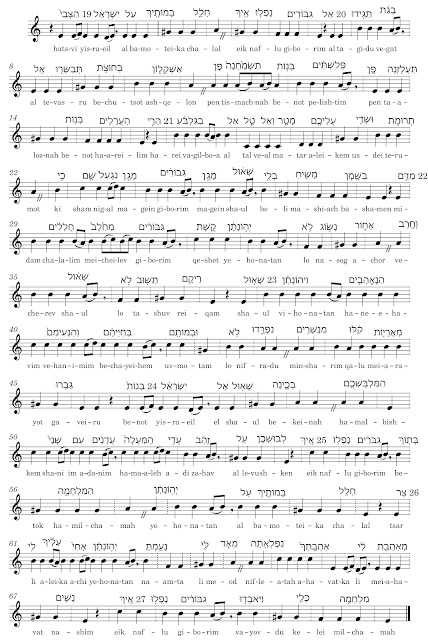This post addresses a number of translation and musical issues.

|
|
Psalms 62: Syllables: 257; Longest recitation: 7; Tenor: e 26.46%;
Ornament density: 12.5%; Average phrase length: 8.8. (Performance available here) |

|
| Preliminary first steps to examining a translation for underlay and melodic suggestions |
Note the repeated phrase in verses 3a and 7a, and the music is identical. Perhaps this psalm could be set with an antiphon. Or is this already a built-in refrain? Is there a hint of uncertainty in verse 3? The gloss much could be used for exceedingly רבֽה rbh. 'I will not be much moved' sounds as if I may be moved a little.
| 1 For the leader. For Jeduthun. A psalm. Of David. (1-1) | |||
| א למנצ֥ח עֽל־ידות֗ון מזמ֥ור לדוֽד | 13 |
a lmnxk yl-idutun mzmor ldvid | |
|
2 ♪B Surely toward God my being is
mute. From him is my salvation. (B-1-4-1) |
|||
|
ב א֣ך אל־א֭להים דֽומי֣ה נפש֑י מ֝מ֗נו ישועתֽי |
10 7 |
b aç al-alohim dumiih npwi
mmnu iwuyti |
|
|
3 Surely he is my rock and my
salvation, my retreat. I will not be exceedingly moved. (1-4-1) |
|||
|
ג אך־ה֣וא צ֭ורי וֽישועת֑י מ֝שגב֗י לא־אמ֥וט רבֽה |
8 7 |
g aç-hua xuri viwuyti mwgbi la-amoT rbh |
|
|
4 How long please will you rail
over a person? You will be demolished all of you, as a bulging house wall, a fence pushed over. (1-2-4-1) |
|||
|
ד עד־א֤נה תהֽותת֣ו על־איש֮ תרצח֪ו כ֫לכ֥ם כק֥יר נט֑וי ג֝ד֗ר הדחויֽה |
13 4 5 |
d yd-anh thottu yl-aiw trxku culcm
cqir nTui gdr hdkuih |
|
|
5 ♪C Surely from his lifting up they
conspire to entice. They favour a lie. In his mouth, they bless, but within they deny. Selah. (C-1-2-4-1) |
|||
|
ה א֤ך משאת֨ו יעצ֣ו להדיח֮ ירצ֪ו כ֫ז֥ב בפ֥יו יבר֑כו ו֝בקרב֗ם יקללו־סֽלה |
15 6 7 |
h aç mwato iyxu lhdik irxu czb
bpiv ibrcu ubqrbm iqllu-slh |
|
|
6 ♪B Surely of God be mute, my
being, for from him I wait. (B-1-4-1) |
|||
|
ו א֣ך ל֭אלהים ד֣ומי נפש֑י כי־מ֝מ֗נו תקותֽי |
8 6 |
v aç lalohim domi npwi ci-mmnu tqvvti |
|
|
7 Surely he is my rock and my
salvation, my retreat. I will not be moved. (1-4-1) |
|||
|
ז אך־ה֣וא צ֭ורי וֽישועת֑י מ֝שגב֗י ל֣א אמֽוט |
8 6 |
z aç-hua xuri viwuyti mwgbi la amoT |
|
|
8 Upon God is my safety and my
glory, the rock of my strength, my refuge in God. (1-4-1) |
|||
|
ח על־א֭להים ישע֣י וכבוד֑י צור־עז֥י מ֝חס֗י בֽאלהֽים |
9 8 |
k yl-alohim iwyi ucbodi
xur-yuzi mksi balohim |
|
|
9 Trust in him for all time, O
people. Pour out in his presence your heart. God is a refuge for us. Selah. (1-4-1) |
|||
|
ט בטח֘ו ב֤ו בכל־ע֨ת ע֗ם שפכֽו־לפנ֥יו לבבכ֑ם אלה֖ים מחסה־ל֣נו סֽלה |
15 10 |
T bTku bo bcl-yt ym wpcu-lpniv lbbcm
alohim mksh-lnu slh |
|
|
10 ♪C Surely the children of
humanity are futility, a lie, the children - each. To ascend in the balance, they are futile altogether. (C-1-2-4-1) |
|||
|
י א֤ך ה֥בל בנֽי־אדם֮ כז֪ב בנ֫י־א֥יש במאזנ֥ים לעל֑ות ה֝֗מה מה֥בל יֽחד |
11 6 7 |
i aç hbl bni-adm czb bni-aiw
bmazniim lylot hmh mhbl ikd |
|
|
11 Do not trust in oppression or in
robbery. Do not become futile. If wealth profits, do not set your heart on it. (1-2-4-1) |
|||
|
יא אל־תבטח֣ו בעשק֮ ובגז֪ל אל־ת֫הב֥לו ח֤יל כֽי־ינ֑וב אל־תש֥יתו לֽב |
14 4 5 |
ia al-tbTku byowq ubgzl al-thblu
kil ci-inub al-twitu lb |
|
|
12 God spoke once. Twice I heard
this, for strength is God's. (1-4-1) |
|||
|
יב אח֤ת דב֬ר אלה֗ים שתֽים־ז֥ו שמ֑עתי כ֥י ע֝֗ז לאלהֽים |
13 5 |
ib akt dibr alohim wtiim-zu wmyti
ci yoz lalohim |
|
|
13 And of you my Lord there is
mercy, for you yourself pay each according to its deeds. (1-4-1) |
|||
|
יג ולךֽ־אדנ֥י ח֑סד כֽי־את֨ה תשל֖ם לא֣יש כֽמעשֽהו |
6 12 |
ig ulç-adonii ksd ci-ath twlm laiw cmywhu |
|









